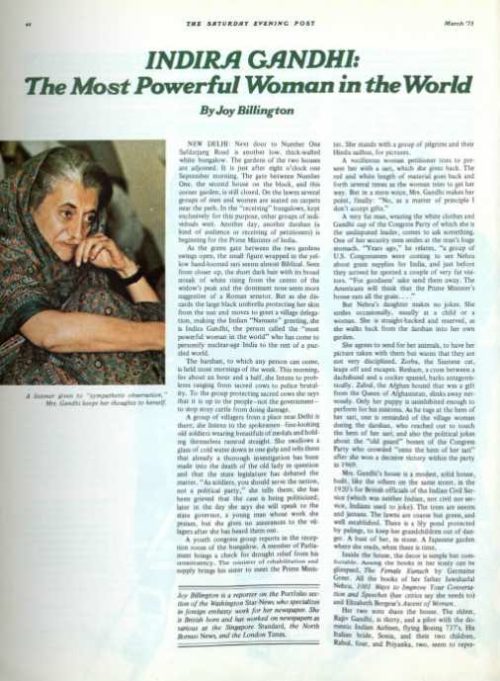Indira Gandhi: The First Iron Lady of Politics
Today marks the 100th birthday of the Indian Prime Minister, Indira Gandhi. Though their names were similar, there was no connection between Indira Gandhi and the country’s great champion of independence, Mahatma Gandhi.
Nor was there much connection in their style of politics. In contrast to the Mahtama’s peaceful non-cooperation tactics, Indira boldly used her power as the head of state to undercut her opponents.
In her 1975 interview by the Post, she seems to be a stern, focused woman of steely determination. “She is straight-backed and reserved,” wrote Joy Billington, who described petitioners trying to present the Prime Minister with a sari. Several times the outfit was passed back and forth, the petitioner insisting on getting Indira to accept the dress. But the Prime Minister “makes her point, finally: ‘No, as a matter of principle I don’t accept gifts.’”
Just how determined she could be was revealed just three months after this article appeared.
An Indian court found her guilty of violating campaign laws in her 1971 election, which had led to her appointment as Prime Minister. As punishment, she would have to give up her office and stay out of politics for six years. She appealed the conviction. But when that didn’t work, she declared a national state of emergency and remained in office.
The emergency lasted two years and angered many Indians by introducing laws limiting personal freedoms. When she ended the emergency, her political opponents, many of whom had been jailed, worked to remove her from power. They succeeded in 1977. She was imprisoned for a few months on corruption charges, but in 1979, she and her party returned to power.
In 1984, she was assassinated by her bodyguards, members of the Sikh faith, in retaliation for her ordering the military to put down a Sikh separatist group.
She played a particularly tough brand of politics and, judging by her career, she played it well.

Featured image: Indira Gandhi (Library of Congress)